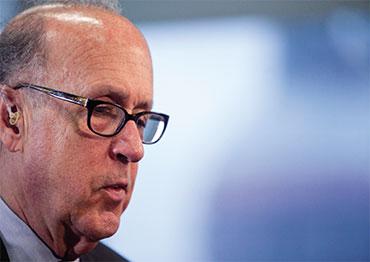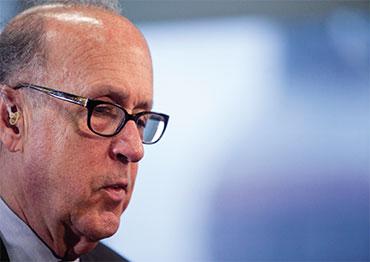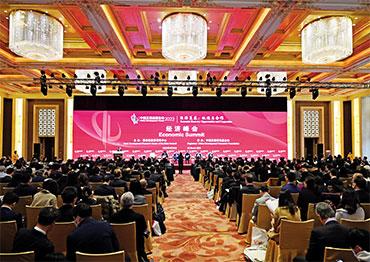he escalation of the tension between the US and China is driven by the false narratives of both nations toward each other, argues Stephen Roach in his new book Accidental Conflict: America, China and the Clash of False Narratives, and in his interview with NewsChina on March 27 during the China Development Forum (CDF) in Beijing.
“The idea of limited conflict in a relationship where there is no trust is too optimistic,” he warned, and made his proposals to transform the relationship from a conflicted codependency to a healthy interdependency.
Roach was Chairman of Morgan Stanley Asia for 30 years before he joined Yale University in 2010. He is currently a Senior Fellow at Yale Law School’s Paul Tsai China Center.
NewsChina: Do you feel people still like frank and open discussions about US-China relations?
Stephen Roach: I’ve had a number of meetings during this trip to China. The issue is one that people are comfortable debating. There are a lot of misimpressions on both sides. I call them false narratives. What I say [in the book] is America does not have a China problem, and China does not have an America problem. Both of us have a relationship problem. We have failed to sustain a strong and trusting relationship. And that’s what I wrote a book about. I believe that puts both of us at risk.
NC: What could be done to rebuild trust?
SR: The focus of the book is that we have a relationship problem. If that’s right – and I argue it is – then we need a relationship solution. By a relationship solution, we need initiatives that require mutual understanding and support on both sides, rather than the US imposing a solution on China, or China imposing a solution on the US. That won’t work.
So I propose three things. The most important is rebuilding trust, and I give a number of areas where that can happen. Without trust, we get nowhere. But then the second aspect of what I argue for is a bilateral investment treaty (BIT), which lowers investment barriers in both countries and restarts the process of economic integration. This is so supportive for jobs and for multinational companies. Then thirdly, I say we’ve got to build a new, permanent framework of engagement, because the one we have right now is not working at all. We used to have big high-level strategic and economic dialogues between the US and China once or twice a year. But there was no continuity between these events. Once the summit was held, people that worked on the bilateral relationship would go back to their day jobs. I’m arguing in the third recommendation in my book for the permanent establishment of a new organization that I call the US-China Secretariat, which operates full time, 24/7, and focuses on all aspects of the relationship, from economics and trade, to technology, state subsidies of enterprise activity, climate change, health, cyber security and human rights. And it has the ability to develop collaborative policy proposals, developed jointly by Chinese and American professionals, policy proposals aimed at solving common problems. And when disagreements occur, the secretariat would have a dispute resolution function to try and address the disagreements.
It’s a plan that requires mutual commitment on both sides, but it starts with trust. And right now, there is no trust. So because of that, do the little things first – like open consulates that have been closed in Chengdu and Houston, relax visa requirements for travel, restart student foreign exchange programs, remove constraints on NGOs to bring mutual collaboration of civil society back together. And then work together in solving huge issues that affect both nations and affect the world like climate change, health, cyber [security]. We’re not going do that overnight, but that’s the agenda – again starting with little steps first.
NC: That’s a very interesting suggestion that we should start from professional talks.
SR: I get that from years of coming to CDF, where we have long been focusing on China’s most critical issues. I also get that from participating in the US-China Track Two Dialogue (dialogues organized by Chinese and US non-government organizations on a number of specific issues, such as digital economy, health care and climate change) that I have been engaged with for close to 15 years, meeting twice a year. We don’t always agree, but we find common areas to make joint recommendations. It can be done, because we have mutual respect. We have similar levels of expertise in the way we analyze issues. We use a common framework, common data, and we’re able to come to a mutual understanding on many, but not all issues.
And I don’t like the term “working groups.” That sounds too much like government bureaucracy. I want to get away from that. Imagine the secretariat in a big building in a neutral country like Switzerland. It should not have separate floors for Chinese and American staff. The professionals should be working together on commingled floors, organized functionally by issue rather than by national identity.
There would be two co-heads. One would be Chinese, one would be American. They would have reporting lines to their governments, which is to make certain that the work of the secretariat gets communicated into the decision-making process. It’ll take considerable time to set this up. But it will be worth the effort. Chinese and American professionals would be coming to work together in the same building every day. That starts to build relationships on a solid foundation of personal trust.
I have done precisely that in my relationships with my Chinese counterparts, economists and other professionals alike, that I’ve built solid relationships with over the years. It’s great to see them again. And I trust them. We don’t always agree, but we have a mutual understanding and respect for one another.
NC: Another of your suggestions is the need for a bilateral investment treaty, or BIT. It seems unlikely now, but should we start talking about it?
SR: In 2016, we were 90-95 percent of the way done. Then Donald Trump gets elected and takes it off the table and ended up replacing it eventually with the Phase One bilateral trade fix, which completely failed. That’s the wrong approach.
NC: Can we get back to a BIT?
SR: Not overnight. I think we first need to reduce the level of animosity. The US trade representatives office in the executive branch of the US government has historically been in charge of negotiating bilateral investment treaties. The last US trade representative for the Obama administration was Michael Froman, who underscored that BIT negotiations between the US and China were between 90 to 95 percent complete in 2016. The new US trade representative Katherine Tai will not talk about a BIT, even though her predecessor on the Democratic side was very much in favor of it. She still wants to talk about looking at US-China through the failed Phase One perspective.
And that’s the wrong perspective. It’s theoretically wrong. It’s analytically wrong. It’s empirically wrong.
NC: What are US companies’ concerns about investing in China?
SR: China probably has the largest number of investment treaties with other countries around the world. The US has a lot, but not nearly as many as China.
The barriers to multinationals investing in China are relatively low for many countries. The US is an exception because we don’t have a bilateral investment treaty. And politically, we’re talking about imposing sanctions on American multinationals investing in China. That hasn’t happened yet. But there’s discussion of that in the US Congress right now. And if you ask me what can China do to reduce that, it goes back to the issues we’re talking about, which is the relationship dysfunctionality.
There is an urgent need to repair a damaged relationship and to stop this politically-induced escalation of conflict before it is too late.
NC: What kind of relationship do you hope the US and China will reach in the future?
SR: The last part of my book, the final three chapters, lays out my three-step plan for conflict resolution and stressing the consequences of failing to shift the relationship from a conflicted and destructive codependency to a healthier and more sustainable interdependency.
By interdependency, both nations will be more secure. They will relate to one another from a perspective of strength. In doing so, they will be better able to address many of their own problems and not feel compelled to blame the other for self inflicted problems. For example, the US has a shortfall of domestic savings, so we naturally have trade deficits; but we blame that on China. If we were to address our saving shortfall, we wouldn’t have to be blaming others. Thirty years ago, we blamed Japan, and now we’re blaming China.
Interdependency means solve your own problems first and avoid blaming others for your own shortcomings. This applies equally to China: Rebalance your economy, stimulate internal private consumption, build out a social safety net, do a better job at retirement health care. And your consumer economy will stand a better chance of coming to life than it is right now. Don’t blame America for your own problems. Interdependency offers all that and more.

 Old Version
Old Version

